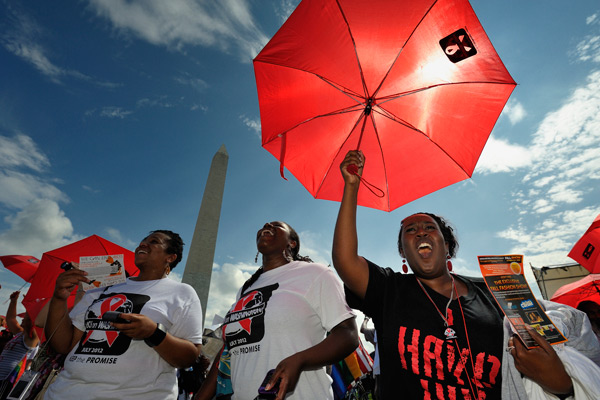
WASHINGTON (CNS) — As someone living with HIV, the virus that causes AIDS, Joshua Mavundu would welcome a cure for the disease. He knows intimately its ravages. His weight dropped to 70 pounds before he was tested and put on antiretroviral medication by a Catholic AIDS program in Zimbabwe. Today, he feels healthy and weighs almost 175 pounds.
Mavundu was in Washington for the XIX International AIDS Conference July 22-27. He also participated in a two-day gathering of Catholic AIDS workers held beforehand. He arrived as news reports gushed about the U.S. government's approval of a pill to help prevent HIV infection, and the claims of some scientists to be close to developing a cure for the deadly disease.
“I openly live with HIV, so I share the excitement about a possible vaccine and cure,” Mavundu told Catholic News Service. “But we need to look back at what we've learned about solidarity, about people coming together and being united, and we should keep that intact. Talking about vaccines is fine, but we shouldn't forget solidarity and justice and community.”
Mavundu is the gender and advocacy officer of the Batanai HIV and AIDS Service Organization in Masvingo, Zimbabwe, a program supported by Trocaire, the Irish bishops' overseas aid agency.
There have been rumors of a cure before, but the deadly virus has proved itself to be a wily survivor. This time around, however, scientists and AIDS officials believe they're on the verge of something big.
Like Mavundu, several conference participants who work in faith-based responses to HIV and AIDS are nonetheless concerned that the sudden interest in the science of curing AIDS will distract the world from the lessons learned in 30 years of battling the epidemic. They say simply coming up with a pill to kill HIV won't solve all the problems the virus has caused.
The initial conference discussions have focused heavily on medical issues, much to the frustration of Maryknoll Father Richard Bauer, who runs a massive HIV education and treatment program in Namibia. He told CNS July 24 that while finding a cure is vital, it is important that AIDS workers remember to work with local communities to limit the spread of the disease.
Father Bauer said the virus will leave behind a painful legacy, even if a cure is found.
“Even if we got a vaccine tomorrow and a cure on Monday, we have two generations of children who have not been parented,” he said. “They're now becoming parents and they've never been parented. In the high impact countries that had all the deaths in the late 1990s and early 2000s, nobody is talking about the social and developmental ramifications of not being parented. Even if they announce a vaccine and a cure at this meeting, we still have a lot of work to do.”
Mavundu pointed out that some 8 million people around the world are eligible for antiretroviral treatment but cannot afford the medicines. Such inequality, he warned, will likely plague the distribution of any new drugs.
“Even with a cure, there's no guarantee that everyone can access it. Already we see shortages of ARVs in Africa, especially in my country,” he said, referring to antiretroviral drugs. “So if a cure comes today, not everyone will be able to afford it.”
In Myanmar, one Catholic HIV expert said, the disease has provided a rare opportunity for collaboration.
“In our country, AIDS is one place where people come together from different strata, backgrounds and beliefs, and work together in a very democratic process,” said Soe Naing, social mobilization adviser at UNAIDS. “We listen to key affected populations, we listen to people living with HIV and we hear their voice and try to build up their capacity and empowerment.
“This is unusual compared to other development sectors in a country like Myanmar. AIDS is definitely a bad disease but we can learn a lot of lessons from our experience with it, of bringing people together and building consensus. It has encouraged empathy and understanding. Even if HIV goes away tomorrow, that solidarity will remain,” he said.
Michele Broemmelsiek, the global director for AIDSRelief at Catholic Relief Services, said organizations like hers work best when they help community members solve their own problems.
“When you truly engage the community, that's when you really win the fight against AIDS. If you just base your work on a medical response, train doctors, get the best laboratory equipment, fix up the pharmacy, you still haven't won the fight against AIDS. When you can address stigma and provide support to affected people in the community, that's when true justice happens,” she said.
Catholic institutions have long offered clinic- and home-based health care programs, but Broemmelsiek said AIDS has pushed the church deeper into communities. “As faith-based groups advocate for health for everyone, they're building a future at the grassroots that's more important than a vaccine or new treatment, because it reknits the community together,” she said.
Finola Finnan, chair of the Catholic HIV/AIDS Network and the head of Trocaire's HIV and gender equality program, said the political and social context that made HIV infection a fatal epidemic remains a challenge, whether or not a cure appears.
“The epidemic has taught us that we need to go back to our roots and talk about justice, gender and equality. Those are the social determinants that are driving this epidemic. HIV has put a spotlight on those at the margins who need to have a voice, on women needing to be at the decision-making table, and on the factors that drive poverty. That's what the epidemic has taught us, and we won't end it until we deal with those issues,” Finnan said.
— By Paul Jeffrey, Catholic News Service






